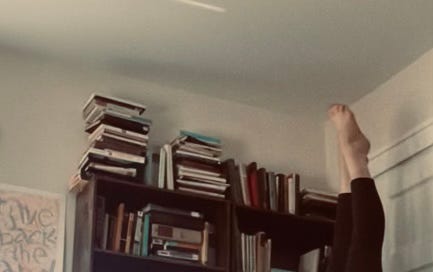At this point, all I am really interested in is feeling.
At this point - I feel like I say that a lot these days. I preface everything I say with it. It feels a necessary launch to all possible utterance. I have to acknowledge how hard it’s been. I cannot not talk about the state of the world, politics, public health, the portents of war, and the unraveling of social niceties. People are dicks. The news cycle requires either a stiff drink, a curated apathy, or a release valve. At this point in public health; at this point in the history of the Supreme Court; at this point in our reckoning with racism or misogyny; at this point in the history of media; at this point of the war; at this point of a serious yoga practice. Ad nauseam.
Related terms of inquiry: at what point, to make a point, and at no point. These don’t seem to crop up, much as we might go there or perhaps should. It might be refreshing. It might at least be a new approach, or resolute. These terms peek or peak. They are potential. They loom like anarchy, collapse. They also hint like springtime, heaven, idealized society, milk and honey. But no. They do not come up. Just at this point, again, and yet one more time.
I assume (at this point) that what draws most of us to a thing like yoga is sensation, feeling, and emotion. This plays out endlessly: either we feel some sensation we’ve never felt before and become intrigued or we are sick to death of the way we feel and we want to feel different. We have heard that yoga does that.
It’s interesting, really: this vagueness between sensation and emotion. Both are ‘feeling’, in English and half a dozen other languages I can pick my way through. There are also declensions: there are more specific words for sensations (tight, raw, heavy, ache) and emotions (anxious, grieving, sad, outrage). There are hybrid words for the weaving of an emotive event - like sadness - with physiological components such as a cloudy mind, density in the chest, a heaviness in the breathing, a lack luster in the limbs or a desire to sit down. There is language that invokes the cognitive material of emotive experience: hopeless, overwhelmed, crazy, hateful, dangerous, oppressive, democratic, autocratic, terrorist, betrayal, end of some epoch or system or innocence.
What an embodied contemplative practice gives us is not so much soothing as it is moving.
Another thing that happens to my speech and thought: it pulls back and back on itself. I say a thing and immediately need to reflect it, clarify, define, contextualize. Everything I say is untrue in most of the ways we could consider, but essentially true in the one way I’m looking for.
Soothing, for example.
Soothing is what most of us think we need. It is what we want. Even for folks who wouldn’t at first say so, who would say something more along the lines of passion, deep, thrill; if you say you want passion you actually mean you want to sooth your apathy, if you want deep it’s because things feel stupid, and if you crave thrill it’s because you are numb.
And we do get it, “soothing”. But ‘it’ is not what we’d expected. Soothing invokes some reckoning, which is not smooth and soft and comfortable but difficult, honed, humbling. And passion, deep, thrill catches us up in wait a minute, can you really handle that, the more integral questions of consistency and hard work. Which is not what we thought we meant, now that it’s put to us. That’s not what we wanted.
The funny thing is, embodied contemplative practice doesn’t give us what we want but does leave us feeling better. It makes us feel better mostly by dissolving what we thought we wanted and resolving us to something else.
In other words, moving us from one perspective to a different one.
Moving, to be moved, is the quintessence of feeling. It’s archetypal. Paradigmatic. Textbook. Classic. Perfect. Sensational. Keen. Bang on.
*
A personal irritation: embodied contemplative practice has destroyed my writing.
It has destroyed my mind. What with everything moving all the time, and no steadiness anywhere, and everything declining into questions. Questions: dubious, tentative, endless. There is discomfort in the experience but delight in the tactility of the language: tentative: a tensile hope; dubious: an uncertain touch.
Yoga has ruined my life. This is true in every way and a lie in the only important one. What remains is an obvious relativity between my mind and my writing. Though blasted, I go on with it. I have to go on with it. It seems I grow words like hair.
*
Keep reading with a 7-day free trial
Subscribe to Gristle and Bone to keep reading this post and get 7 days of free access to the full post archives.



